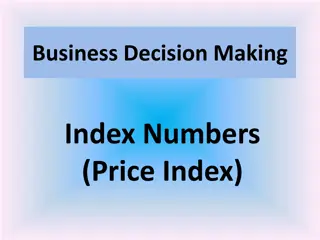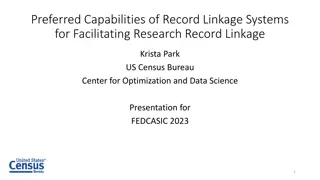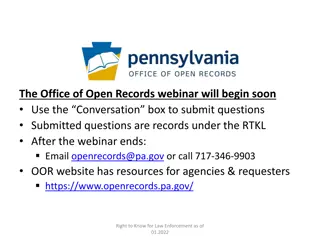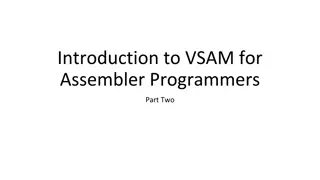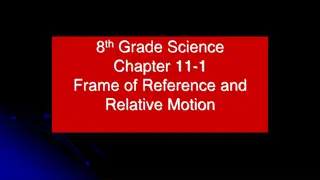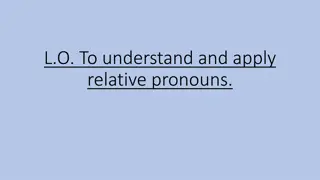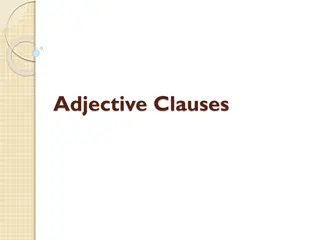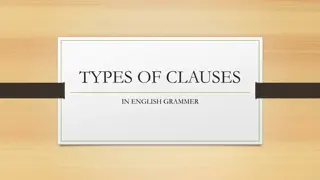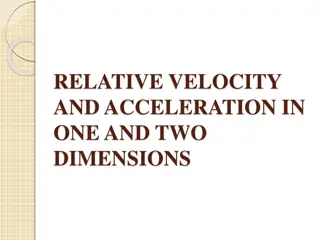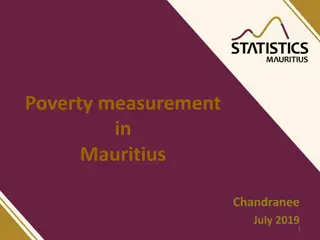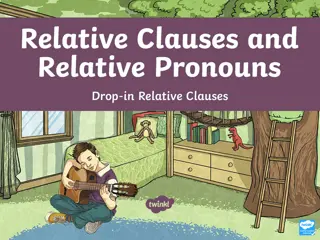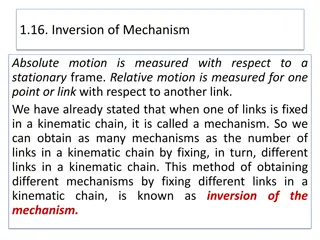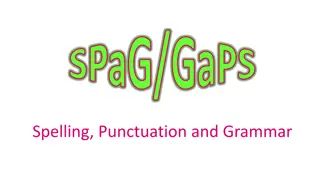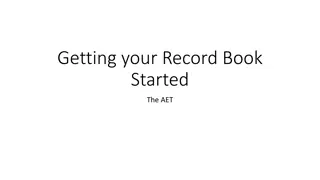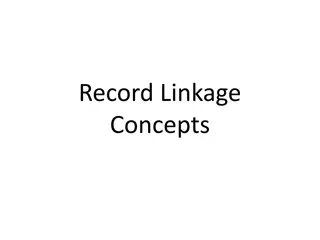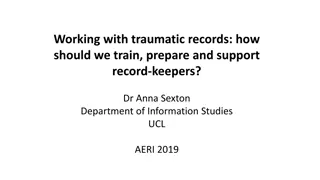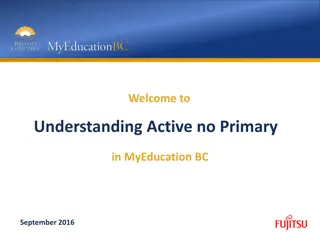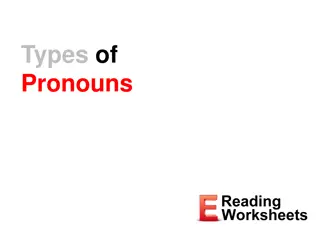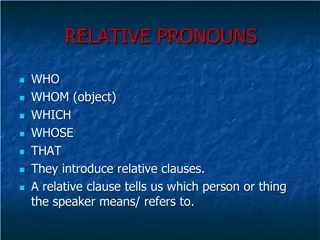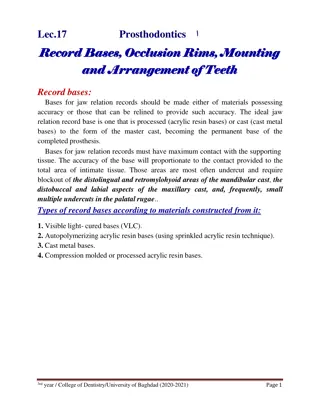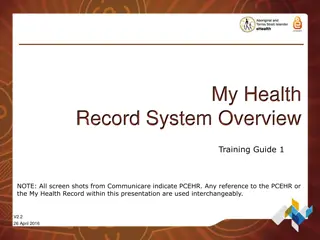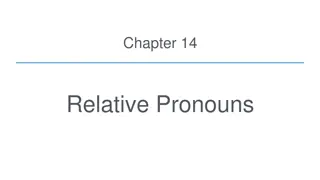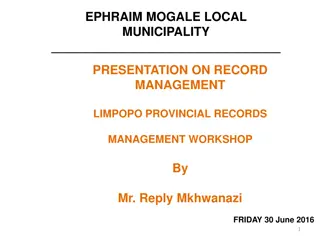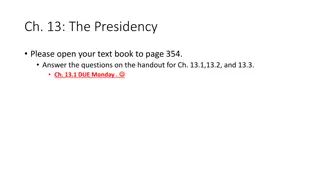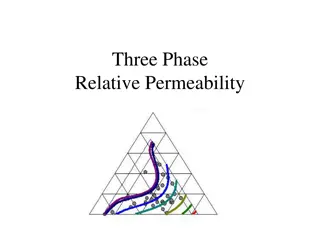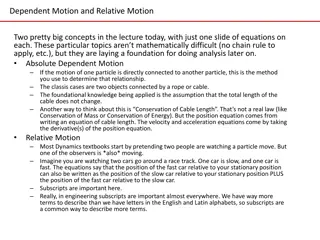Understanding Index Numbers and Their Importance in Business Decision Making
Index numbers are time series that measure relative changes over time, expressing counts or measurements as a percentage of a base period. Learn about base periods, calculation methods, and examples of simple relative and aggregate index numbers in business decision-making contexts.
2 views • 22 slides
Preferred Capabilities of Record Linkage Systems for Research
This presentation by Krista Park from the US Census Bureau explores the preferred capabilities of record linkage systems in facilitating research. It includes disclaimers, details about the researcher stakeholder team, coordination, leadership oversight, and the outline of the linkage process. The f
4 views • 17 slides
Learn to Use Relative Pronouns in Sentences
Explore lessons on identifying and using relative pronouns like "who" and "which" to connect ideas. Practice constructing sentences with these pronouns to refer to people, animals, and objects effectively. Enhance your grammar skills with engaging exercises provided by the Ministry of Education.
1 views • 11 slides
Ghana CPI and Inflation Report for October 2023
The Ghana Statistical Service released the Consumer Price Index (CPI) and inflation data for October 2023. The CPI measures changes in the price of a fixed basket of goods and services, while the inflation rate reflects the relative change in the CPI between periods. Inflation figures for October 20
4 views • 21 slides
Association Between Friendship-Relative Network and Credit Borrowings in Indian Households
This study by Dr. Pallabi Chakraborty explores the impact of friendship-relative networks on borrowing from market lenders in Indian households. It examines the role of social connections in accessing formal and informal credit, and how these networks influence borrowing choices. The study aims to u
0 views • 14 slides
Importance of Cumulative Record Cards in Education
A Cumulative Record Card is a vital document that contains essential information about a student's academic performance, attendance, health, and more. It serves as a comprehensive record that aids in the student's development throughout their school journey and helps in addressing educational, vocat
0 views • 12 slides
Pennsylvania Right to Know Law Update
The Pennsylvania Right to Know Law grants public access to agency records, with agencies needing to prove when a record is not public. This update emphasizes the responsibilities of Agency Open Records Officers (AORO) and outlines prohibitions agencies must not enforce. The Right to Know obstacle co
0 views • 15 slides
Understanding VSAM Logical Record Access Methods
VSAM utilizes three primary methods to find logical records - Relative Byte Address, Relative Record Number, and Key field. Relative Byte Address assigns a unique address to each record based on sequential ordering. Relative Record Number is used in RRDS datasets to access records by a numbered sequ
1 views • 35 slides
Understanding Motion: Frames of Reference and Relative Motion
Motion is defined as a change in position over time. To describe motion accurately, one needs to understand frames of reference and relative motion. Frames of reference are systems of objects used to determine if something is in motion, while relative motion involves movement in relation to a refere
3 views • 14 slides
Understanding Cell References in Spreadsheets: Absolute vs. Relative
Learn the difference between absolute and relative cell references in spreadsheets through practical examples and visual aids. Explore how to model data effectively, create spreadsheets, and use pie charts for result comparison. Get hands-on with homework tasks to enhance your skills further.
3 views • 27 slides
Understanding Relative Pronouns in English Grammar
In this lesson, we delve into the concept of relative pronouns in English grammar. Relative pronouns like who, whom, which, and that are used to connect clauses or phrases to nouns or pronouns. Through examples and exercises, learners can practice identifying and using relative pronouns effectively
4 views • 8 slides
Crime Vocabulary and Grammar: Murder Mystery Exercises and Relative Clauses
Explore crime-related vocabulary like rob, steal, burgle, and murder in the context of a murder mystery story. Practice exercises on robbery, theft, and murder, then delve into relative clauses with examples and explanations. Enhance your understanding of crime terminology and grammar concepts.
1 views • 8 slides
Understanding Adjective Clauses in English Grammar
Adjective clauses, also known as relative clauses, are dependent clauses that act as adjectives in sentences. They modify nouns, pronouns, or entire sentences and begin with a relative pronoun. This article explains how adjective clauses function, provides examples, and discusses the use of pronouns
1 views • 62 slides
Epic Tools for Clinical Research by Shara Power, RN, BSN, OCN
Explore Epic tools for clinical research developed by Shara Power, a skilled application developer specializing in EPIC Beacon Oncology at UIHC Healthcare Information Systems. Learn about managing research study records, investigational study medication orders, and the process for creating and using
0 views • 26 slides
Understanding Types of Clauses in English Grammar
A clause is a fundamental unit of a sentence, comprising a subject and predicate. Learning about the different types of clauses - Independent, Dependent, Relative, and Noun clauses - helps in enhancing grammar skills and sentence structure understanding. Independent clauses stand alone as complete s
1 views • 11 slides
Understanding Relative Velocity and Acceleration in Physics
Relative velocity is defined as the velocity of an object in the rest frame of another object, and it can be negative depending on the difference in velocities. The need for using relative velocity lies in determining if an object is at rest or moving. The formula for relative velocity involves the
1 views • 25 slides
Poverty Measurement in Mauritius: An Overview of Monetary and Non-Monetary Approaches
The measurement of poverty in Mauritius involves multidimensional assessments using both monetary and non-monetary approaches. The country's national priorities include poverty eradication, improving well-being, and ensuring inclusive growth. The monetary approach assesses poverty based on the Relat
1 views • 12 slides
Understanding Relative Clauses and Pronouns
Utilize relative clauses to provide additional information to a noun, using relative pronouns such as who, which, where, when, and whose. Learn how to construct complex sentences with at least two clauses, ensuring the subordinate clause complements the main clause. Explore examples and practical st
1 views • 14 slides
Understanding the Inversion of Mechanisms in Kinematics
Inversion of Mechanisms in Kinematics involves measuring absolute and relative motions in stationary and moving frames, respectively. By fixing different links in a kinematic chain, we can obtain various mechanisms. This process does not alter relative motions but may significantly change absolute m
0 views • 78 slides
Impact of Climate Change on Winter Haze Pollution in Beijing: Role of Relative Humidity
Relative humidity plays a crucial role in the formation of winter haze pollution in Beijing. Studies show a high correlation between wintertime PM2.5 levels and variables like meridional wind velocity and relative humidity. However, the effect of climate change on Beijing haze in the 21st century is
0 views • 11 slides
English Language Basics - SPaG/GaPS, Determiners, Adjectives, Nouns, Pronouns, Relative Pronouns, Punctuation
Enhance your understanding of English language basics with concepts such as SPaG/GaPS, determiners, adjectives, nouns, pronouns, relative pronouns, and punctuation. Dive into the world of grammar essentials for Key Stage One and Two learners, covering topics like parts of speech, sentence structure,
0 views • 61 slides
Understanding Relative Velocity of Bodies in Motion
The content explains concepts related to relative velocity of moving bodies, including diagrams illustrating velocity relationships, application of laws of parallelogram and triangle, analysis of motion in rigid links, and calculation of rubbing velocity at pin joints in mechanisms. It covers scenar
0 views • 23 slides
The AET Record Book Setup Guide
Get a comprehensive guide on setting up your record book on The AET platform, including steps for logging in, creating your profile, adding classes, managing resume information, setting objectives, adding references, and creating SAE projects for a well-rounded academic record. Follow the detailed i
0 views • 20 slides
Understanding Record Linkage Concepts
Explore the fundamentals of record linkage, also known as matching or merging, which involves combining data from different sources for the same individual. Learn about the importance of efficient and accurate duplicate detection, deterministic matching, and the challenges of variations in data betw
3 views • 20 slides
Supporting Record-Keepers Dealing with Traumatic Records
Understanding the impact of traumatic experiences on record-keepers is crucial in training, preparing, and supporting them. Trauma, whether singular, ongoing, or complex, can be represented in records stored in archives. The potentiality of records to carry traumatic experiences requires a thoughtfu
0 views • 15 slides
Understanding Active vs Primary Status in Education System of British Columbia
In the education system of British Columbia, students classified as Active no Primary are those who are no longer active in their Primary School (School of Record) but are active in a Secondary School. This status affects reporting, tracking, and school record maintenance. Schools and Districts have
0 views • 8 slides
Understanding Different Types of Pronouns
Learn about the seven types of pronouns - Personal, Possessive, Reflexive, Relative, Demonstrative, Indefinite, Interrogative. Personal pronouns replace nouns, possessive pronouns replace possessive nouns, reflexive pronouns refer back to the subject, relative pronouns introduce relative clauses, an
0 views • 16 slides
Understanding Relative Pronouns in English
Relative pronouns such as who, whom, which, whose, and that are used to introduce relative clauses in English grammar, specifying which person or thing is being referred to. They play a crucial role in defining and non-defining relative clauses, providing essential information and connecting sentenc
0 views • 16 slides
Essential Concepts in Prosthodontics: Record Bases, Occlusion Rims, and Teeth Arrangement
Prosthodontics involves the meticulous construction of record bases, occlusion rims, and arrangement of teeth for prosthetic restorations. Record bases must provide accuracy and maximum contact with supporting tissues, utilizing materials like acrylic resin or cast metal. Occlusion rims play a cruci
0 views • 8 slides
Sharing Favorite Films and Relative Pronoun Practice
In this conversation, we discuss favorite films, focusing on "The History Boys," and invite you to share your favorite film with details like its title, why you like it, who stars in it, and what it's about. Additionally, there is a practice session on using relative pronouns in defining and non-def
0 views • 12 slides
Understanding 4-H Recognition and Record Keeping Models
Explore the different aspects of the 4-H recognition model including peer competition, participation, progress toward set goals, achieving standards of excellence, and cooperation. Discover how volunteers can assist in successful record-keeping experiences for youth in 4-H programs. Find out more ab
0 views • 21 slides
Understanding My Health Record System: Overview and Benefits
My Health Record System is a shared electronic health record platform introduced by the Commonwealth to securely share health information among patients and healthcare professionals. It aims to improve healthcare coordination, information availability, and quality. Benefits include reduced hospital
0 views • 19 slides
Mastering Relative Clauses in Writing
Enhance your writing skills by mastering the use of relative clauses to draw inferences about characters' feelings, thoughts, and motives. Learn how to add extra information to sentences using relative clauses beginning with who, which, where, when, whose, that, or an omitted relative pronoun. Explo
0 views • 20 slides
Learning Relative Pronouns with Visual Aids
Explore the concept of relative pronouns through a series of helpful images and practice exercises. Enhance your understanding of using relative pronouns in sentences, from basic to more complex structures. Develop your skills with warm-up activities and translation exercises for practical applicati
1 views • 34 slides
Record Management Presentation at Ephraim Mogale Local Municipality
Presentation on record management at Ephraim Mogale Local Municipality in Limpopo, highlighting the municipality's vision, location, overview, and the importance of keeping records for historical purposes and decision-making. The presentation covers key legislative acts and regulations governing rec
1 views • 25 slides
Impact of President Barack Obama's Presidency on the Economy and Healthcare
Since President Barack Obama first took office, the economy has seen significant growth, with nearly 8.4 million jobs added, a record number of job openings, and a considerable decrease in the number of people without health insurance coverage. Corporate profits have also reached record levels durin
0 views • 40 slides
Understanding Three-Phase Relative Permeabilities in Reservoir Engineering
Explore the application, correlations, and traditional assumptions of three-phase relative permeabilities in reservoir engineering. Learn about saturation-dependencies, occupancy models, and the challenges of measuring three-phase relative permeabilities. Discover how to calculate three-phase permea
0 views • 14 slides
Understanding Dependent and Relative Motion in Dynamics
Dependent Motion and Relative Motion are fundamental concepts in Dynamics, providing the foundation for future analysis. Dependent Motion involves constraints like ropes or cables, while Relative Motion considers observers in motion. Dynamics involves applying a limited set of equations in diverse w
0 views • 18 slides
Mastering Relative Pronouns: A Comprehensive Guide
Dive into the world of relative pronouns with this comprehensive guide featuring explanations and examples of using who, whoever, whom, whomever, whose, which, that, and this. Explore how to choose the right relative pronoun for people, places, and things, and learn about their usage in restrictive
0 views • 5 slides
Understanding Relative Pronouns and Adjective Clauses in Literature
Explore the use of relative pronouns and adjective clauses in literary works by authors like Gary D. Schmidt and Jim Murphy. Learn the distinctions between "who," "whose," "whom," and "that" in referring to people and things. Practice identifying and creating examples of adjective clauses starting w
0 views • 10 slides
